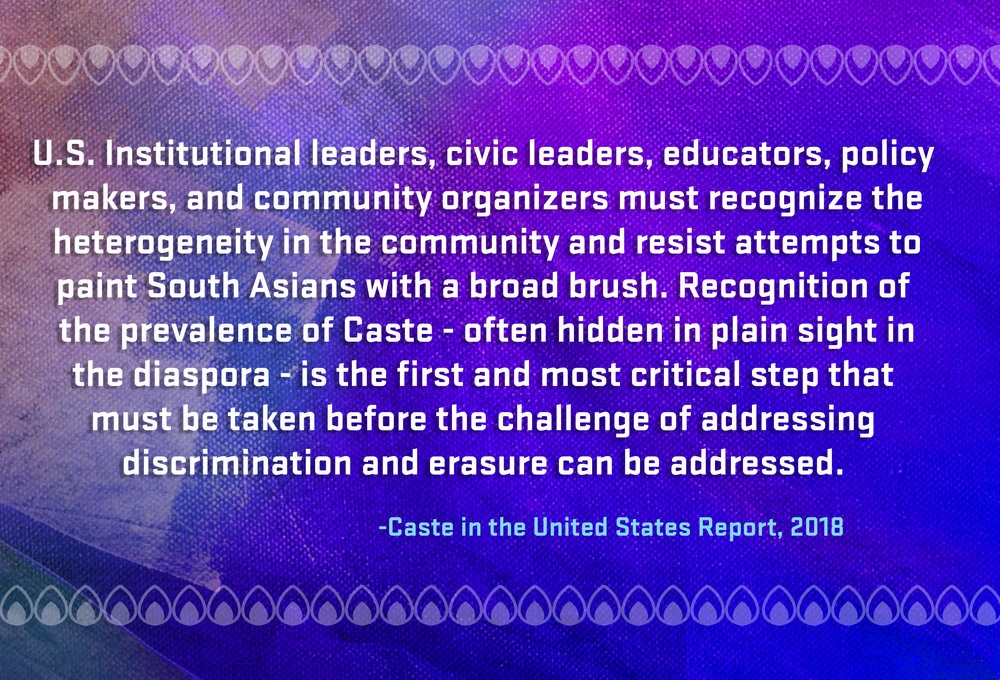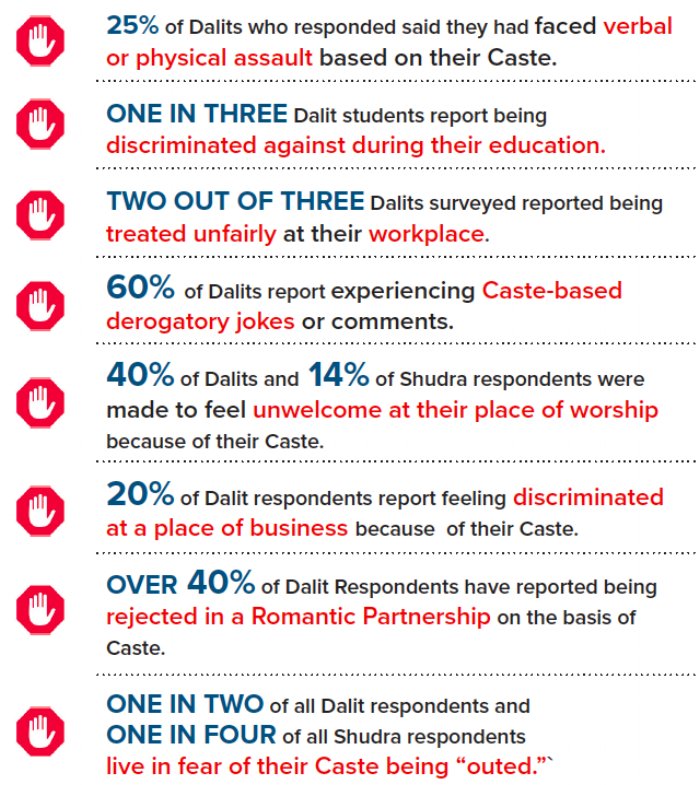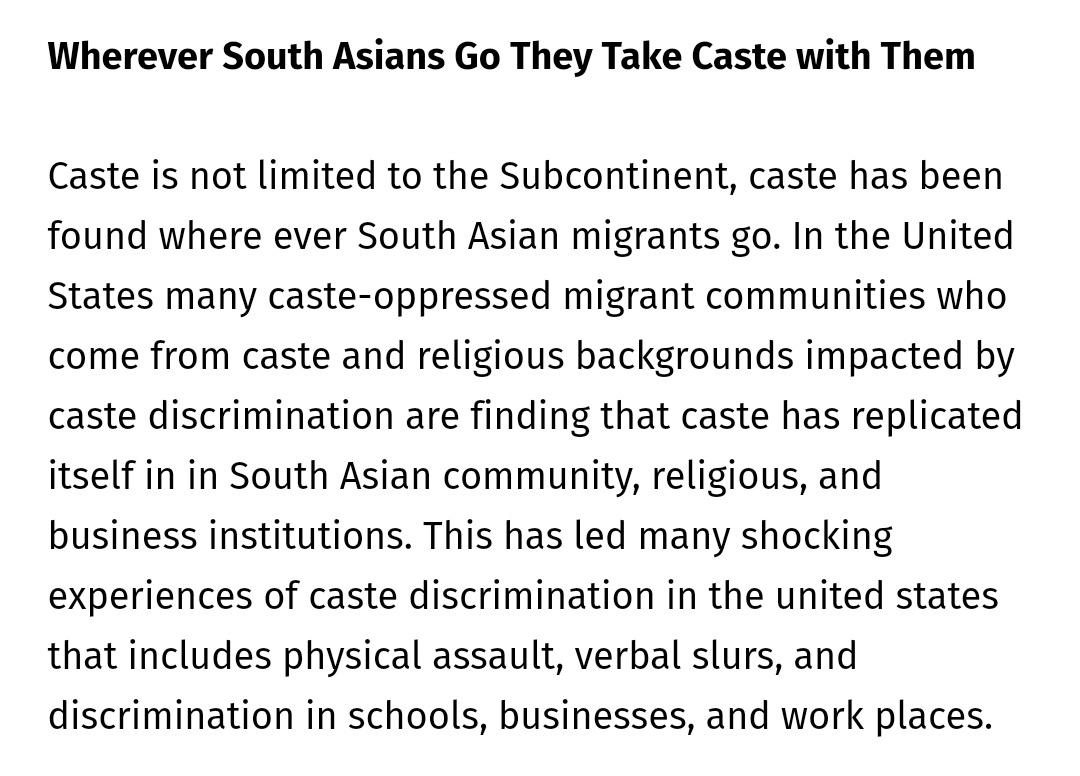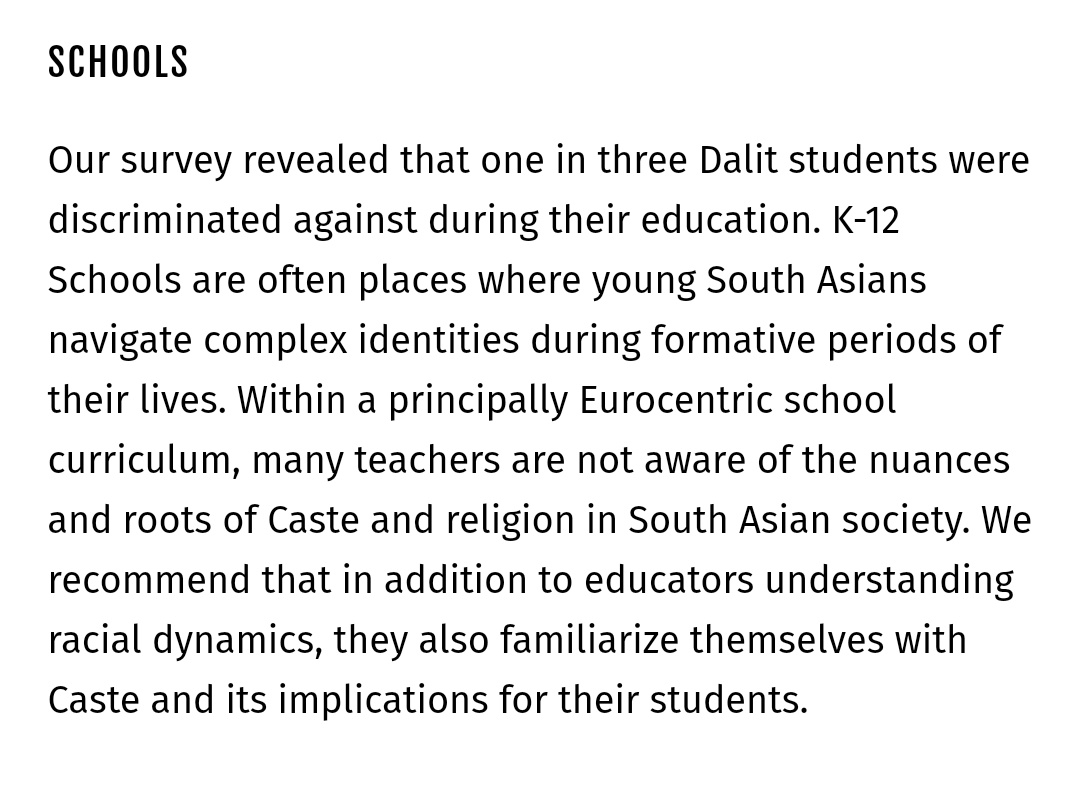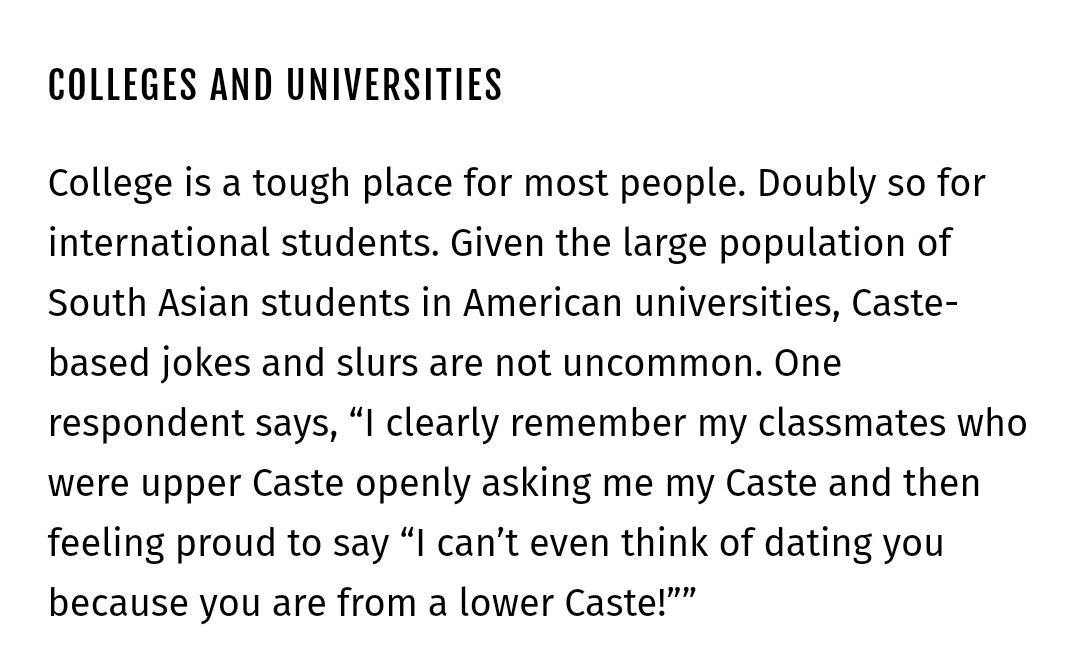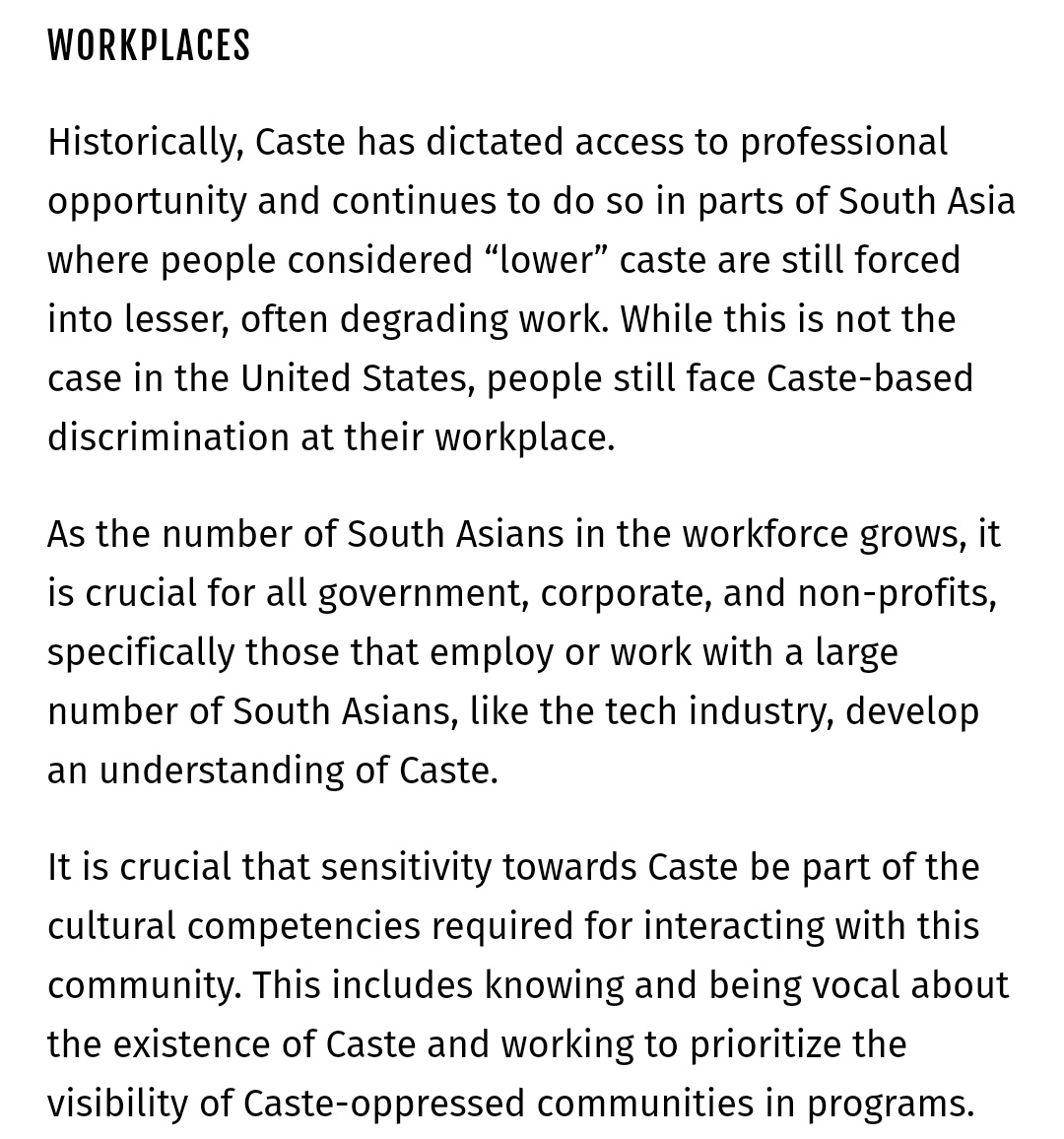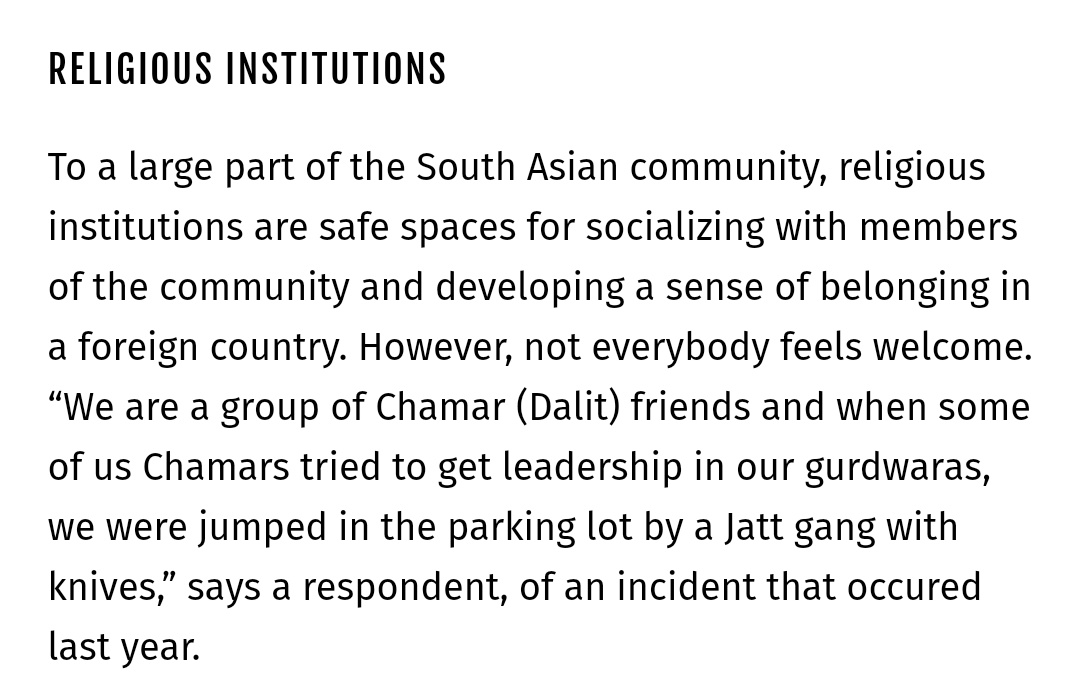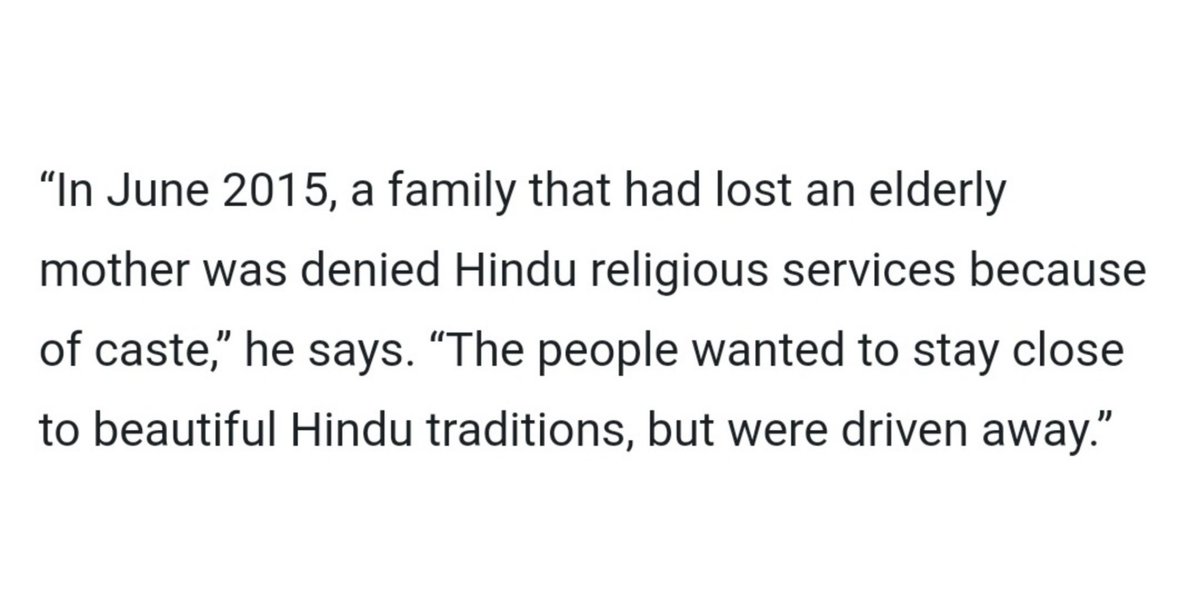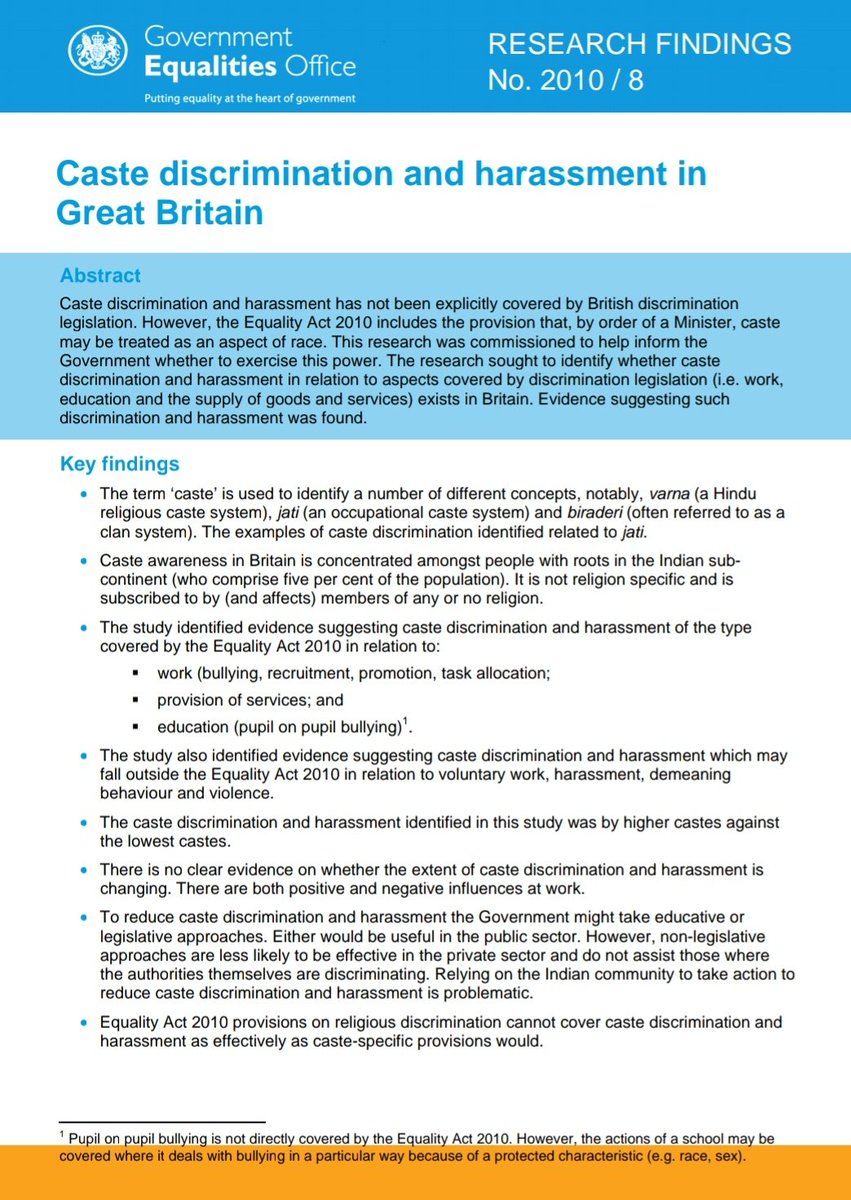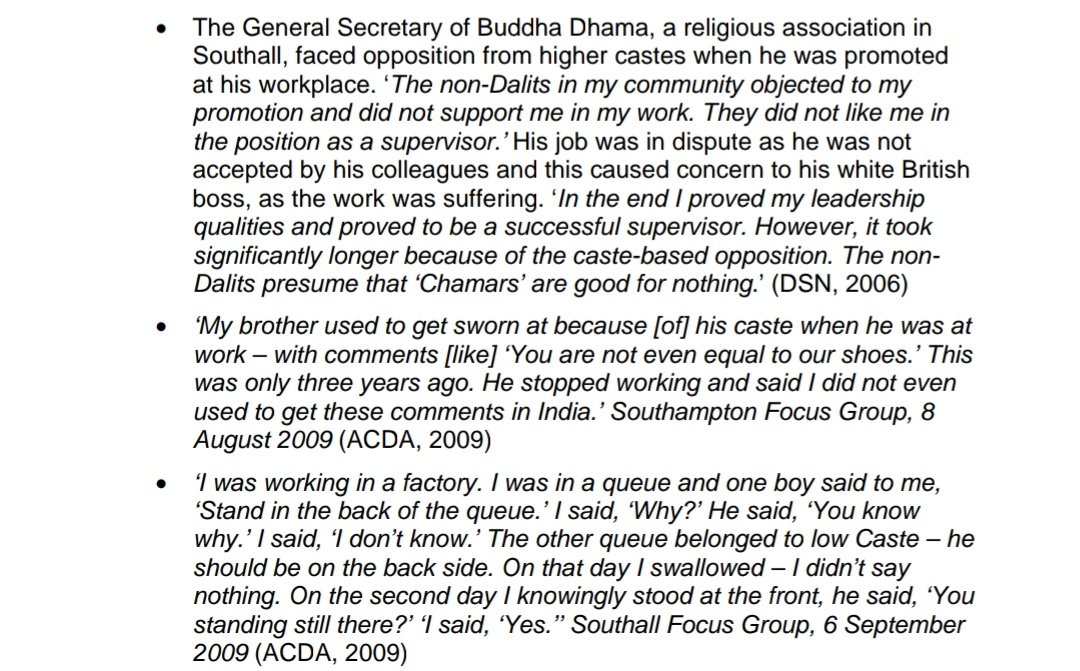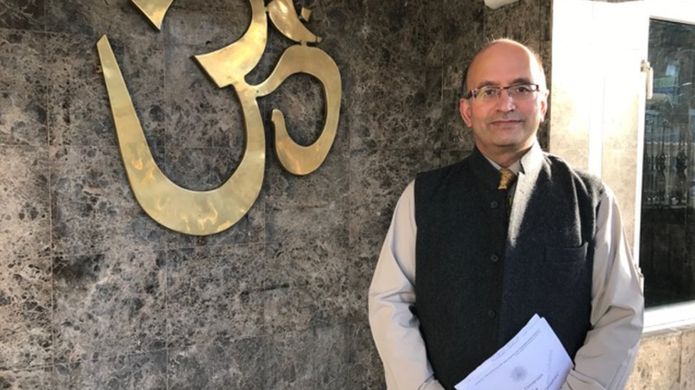Since #BrahminicalViolence was trending a few days back, let& #39;s take a quick jog through the exportation of the caste system that upper caste Hindus have undertaken over the years.
USA
I& #39;ll start with a story of a dalit woman who went to Massachusetts for University.
Preeti Meshram was invited to a party organized by other Indian students at the University.
One of the first things they did there was to go around the room asking everyone& #39;s caste.
I& #39;ll start with a story of a dalit woman who went to Massachusetts for University.
Preeti Meshram was invited to a party organized by other Indian students at the University.
One of the first things they did there was to go around the room asking everyone& #39;s caste.
“And they went around the room with each person saying what their caste was and they skipped over me because they felt so uncomfortable to ask me that question because they just knew I was from a lower caste.”
- Preeti Meshram
- Preeti Meshram
These exercises were designed specifically to establish a hierarchy of authority within the student community.
She says, it often means that a dalit or lower caste student will be isolated from their upper caste peers.
She says, it often means that a dalit or lower caste student will be isolated from their upper caste peers.
She also narrated another story.
TW:Rape
Not long after she arrived at the college, she says she was raped by an upper caste Indian student. There is no doubt in her mind that caste motivated the assault.
TW:Rape
Not long after she arrived at the college, she says she was raped by an upper caste Indian student. There is no doubt in her mind that caste motivated the assault.
“From the first day, how he behaved towards me was a kind of behavior that you observe landlords towards the women who work in their fields, the Dalit women, especially, which is an attitude of ownership and entitlement over their bodies and their time and their labor"
- Meshram
- Meshram
Equality Labs USA did a really good survey about caste and discrimination in the US.
"When we finally got the numbers from our survey, we were just utterly shocked.”
Executive director of Equality Labs
"When we finally got the numbers from our survey, we were just utterly shocked.”
Executive director of Equality Labs
And as expected the Hindu American Foundation (HAF) tried to whitewash the results from this survey by claiming generational differences.
The HAF is primarily run and operated by upper caste Hindus which explains why they would work towards silencing this survey.
The HAF is primarily run and operated by upper caste Hindus which explains why they would work towards silencing this survey.
Wherever Indians go, they take the caste system with them.
This is an excerpt from the Equality Labs survey report.
This is an excerpt from the Equality Labs survey report.
Let& #39;s move to Australia.
Most lower caste people immigrated to Australia hoping to escape caste persecution they had to endure in India.
But due to the changing nature of South Asian immigration to Australia, caste divisions are being replicated there.
Most lower caste people immigrated to Australia hoping to escape caste persecution they had to endure in India.
But due to the changing nature of South Asian immigration to Australia, caste divisions are being replicated there.
Until an upper caste flatmate in a student house in Melbourne refused to lay a hand on money or food utensils that she had touched, Lavanya Raj, a PhD student in psychology at Monash University, says she had never experienced caste discrimination before she came to Australia.
"Caste discrimination is worse than racial discrimination" she says. "Because you are not just considered inferior, but impure."
Excerpt from Caste Acts by Malcolm Knox
Excerpt from Caste Acts by Malcolm Knox
In the same report, there was another interview with another Indian student in Australia, Avishek Gazmere.
"You can& #39;t transcend it, because it is part of your soul. Compared with racism, which is just skin color, caste us about low qualities of your soul, a low intellect...
"You can& #39;t transcend it, because it is part of your soul. Compared with racism, which is just skin color, caste us about low qualities of your soul, a low intellect...
...and leads to your exploitation because as soon as Hinduism is in the mix, you have caste discrimination"
Religious discriminations reflect broader social divisions, according to Gazmere.
Religious discriminations reflect broader social divisions, according to Gazmere.
Race Discrimination Commissioner Dr. Tim Soutphommasane says there& #39;s no legal mechanism to address complaints for caste discrimination in Australia.
*If racism isn& #39;t allowed in this country, why should casteism?" He says. https://www.sbs.com.au/news/australians-subject-to-caste-discrimination-migrants-say">https://www.sbs.com.au/news/aust...
*If racism isn& #39;t allowed in this country, why should casteism?" He says. https://www.sbs.com.au/news/australians-subject-to-caste-discrimination-migrants-say">https://www.sbs.com.au/news/aust...
Next stop is the United Kingdom.
Caste discrimination in the UK Had gotten so bad at one point that the UK govt had to conduct a research in order to look into the possibility of bringing in a specific legislation against caste discrimination.
Caste discrimination in the UK Had gotten so bad at one point that the UK govt had to conduct a research in order to look into the possibility of bringing in a specific legislation against caste discrimination.
Caste based discrimination was polluting the British work force at all levels.
The vast majority of the discrimination came from upper caste Hindus who often held supervisory and managerial positions in companies.
(Metcalf & Rolf, 2010)
The vast majority of the discrimination came from upper caste Hindus who often held supervisory and managerial positions in companies.
(Metcalf & Rolf, 2010)
Another instance of caste based discrimination that gained a nationwide audience was the story of Sudesh Rani, a woman from Bedford.
She was verbally assaulted by two upper caste women at a supermarket.
"They started calling me a low caste chamar, a dirty bitch"
She was verbally assaulted by two upper caste women at a supermarket.
"They started calling me a low caste chamar, a dirty bitch"
She said the women, who had seen her at a wedding previously, followed her and her 9 year old son to her car.
"There were 2 of them and one of them was going to hit me, I thought they were going to rip me apart."
"There were 2 of them and one of them was going to hit me, I thought they were going to rip me apart."
She says the police did not know how to handle her complaint, because they didn& #39;t know about the caste system.
Caste activists in the UK say cases like these highlight why caste legislation is needed in the UK.
(Samani, 2017 - BBC)
Caste activists in the UK say cases like these highlight why caste legislation is needed in the UK.
(Samani, 2017 - BBC)
Since there were no caste-specific legislations in place, the government of UK found it difficult to tackle caste-based discrimination by upper caste Hindus in the UK.
- Caste Discrimination and Harassment in Great Britain (2010)
- Caste Discrimination and Harassment in Great Britain (2010)
In 2010, the House of Lords began conversations about making caste discrimination illegal in the UK.
As expected, this was met with harsh criticism by Savarna organizations.
Satish Sharma, chair of the National Council of Hindu temples led the movement against the legislation.
As expected, this was met with harsh criticism by Savarna organizations.
Satish Sharma, chair of the National Council of Hindu temples led the movement against the legislation.
He claims that the caste system never existed in Hinduism as this legislation is a part of a larger hinduphobic agenda.
Anti-caste activists rightly rubbished his claims and wanted the UK government to go ahead with it& #39;s discussions
The law never passed https://thediplomat.com/2017/12/has-caste-discrimination-followed-indians-overseas/">https://thediplomat.com/2017/12/h...
Anti-caste activists rightly rubbished his claims and wanted the UK government to go ahead with it& #39;s discussions
The law never passed https://thediplomat.com/2017/12/has-caste-discrimination-followed-indians-overseas/">https://thediplomat.com/2017/12/h...
The caste system had also made its way into Canada.
The cases are similar where upper castes in whatever position of authority they hold try and flex their caste powers on lower castes. https://www.cbc.ca/news/canada/british-columbia/indian-caste-system-in-canada-called-a-disease-worse-than-racism-1.3090441">https://www.cbc.ca/news/cana...
The cases are similar where upper castes in whatever position of authority they hold try and flex their caste powers on lower castes. https://www.cbc.ca/news/canada/british-columbia/indian-caste-system-in-canada-called-a-disease-worse-than-racism-1.3090441">https://www.cbc.ca/news/cana...
It seems like the biggest and most successful export commodity has been casteism.
The upper caste Hindu diaspora has managed to keep the caste discrimination issue under cover for the longest period of time.
The upper caste Hindu diaspora has managed to keep the caste discrimination issue under cover for the longest period of time.
But with dalit activism groups popping up everywhere, this seems like something that will be allowed on to the limeliomlre often.
Legislative changes are key but when you have an organized group of Savarnas hell bent on preserving this oppressive system, it can become difficult.
Legislative changes are key but when you have an organized group of Savarnas hell bent on preserving this oppressive system, it can become difficult.
However there is a change emerging from the younger generation and hopefully this will be mainstreamed to a point where we can finally see legislative changes.

 Read on Twitter
Read on Twitter